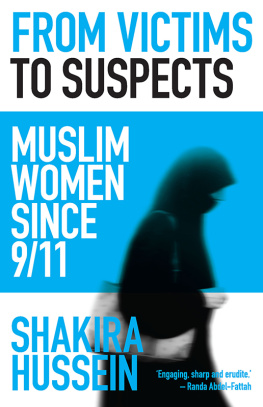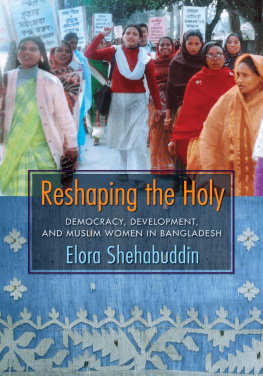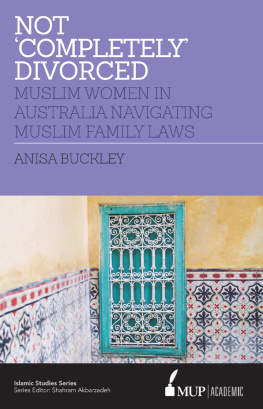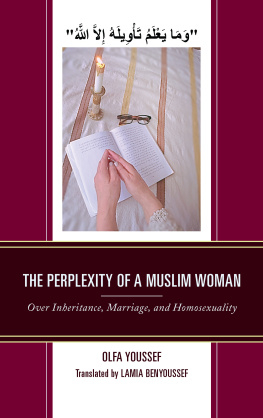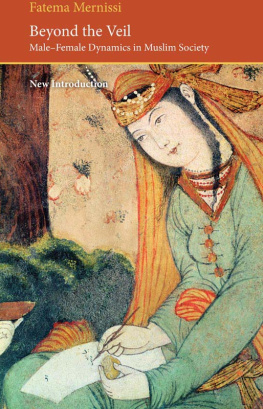Muslim Womens Choices
Cross-Cultural Perspectives on Women
General Editors: Shirley Ardener and Jackie Waldren, for The Centre for Cross-Cultural Research on Women, University of Oxford
First published 1994 by Berg Publishers
Published 2020 by Routledge
2 Park Square, Milton Park, Abingdon, Oxon OX14 4RN
605 Third Avenue, New York, NY 10017
Routledge is an imprint of the Taylor & Francis Group, an informa business
1994 Camillia Fawzi El-Solh and Judy Mabro
All rights reserved. No part of this book may be reprinted or reproduced or utilised in any form or by any electronic, mechanical, or other means, now known or hereafter invented, including photocopying and recording, or in any information storage or retrieval system, without permission in writing from the publishers.
Notice:
Product or corporate names may be trademarks or registered trademarks, and are used only for identification and explanation without intent to infringe.
Library of Congress Cataloging-in-Publication Data
A Catalogue record for this book is available from the Library of Congress
I. El-Sohl, Camillia Fawzi
II. Mabro, Judy III. Series 305. 420917671
ISBN 0-85496-836-9 (paper)
0-85496-835-0 (cloth)
British Library Cataloguing in Publication Data
Muslim Womens Choices (Cross-cultural Perspectives on Women Series)
ISBN 13: 978-0-8549-6835-0 (hbk)
Contents
Camillia Fawzi El-Solh and Judy Mabro
Helen Watson
Ziba Mir-Hosseini
Gloria Thomas-Emeagwali
Rosemary Ridd
Cornelia Sorabji
Gillian Tett
Tamara Dragadze
Naila Kabeer
Jacqueline Siapno
Guide
This book arose from a seminar series on Women in Muslim Communities: Religious Belief and Social Reality, organised in 1991 by the Centre for Cross-Cultural Research on Women, University of Oxford (though the paper by Gillian Tett was subsequently commissioned). The aim of this volume is to contribute to the on-going, exciting and controversial debate on Islam in the contemporary world.
The contributions provide us with insights into the complexity of Islam and the diverse lives of Muslim women, which will be of interest to social scientists concerned with gender and ideology. The book will also be of relevance to those working towards a greater understanding of non-western cultures and societies, an understanding which should aim to explain without being apologetic, and to be critical without being patronising.
Several people were kind enough to read and comment on the first draft of this introduction, and we would like to thank them all: Sara Ahmed, Derek Hopwood, Nahla Khalifeh, Robert Mabro, Marion Farouk Sluglett, Cecillie Swaisland. Particular thanks go to the series editors, Shirley Ardener and Jackie Waldren, for their support and encouragement.
Tamara Dragadze is a Research Fellow at the School of Slavonic and East European Studies, University of London. She was born in Oswestry, Shropshire of Georgian descent, and has done research on the Caucasus since 1969. Her D. Phil. from the University of Oxford was entitled The Domestic Unit in Rural Soviet Georgia. She has published extensively on the Caucasus and nationalism.
Camillia Fawzi El-Solh is a Research Associate at the Centre for Cross-Cultural Research on Women, University of Oxford and a freelance consultant on gender and development in the Arab region. She is also interested in the field of migration and has carried out fieldwork on Egyptian peasant families in Iraq and, more recently, on Arab communities in Britain, a subject on which she has published. Together with Soraya Altorki she has edited and contributed to Arab Women in the Field: Studying your own Society (Syracuse University Press, 1988).
Naila Kabeer is a Fellow at the Institute of Development Studies at the University of Sussex, doing research and training on gender, poverty, population and health issues. She is a Director of the IDS short course Women, Men and Developmentand is at present completing a book called Reverse Realities: Gender Hierarchies in Development Thought, which will be published by VERSO in Spring, 1994.
Judy Mabro works as an editor and is the author of Veiled Half-Truths: Western Perceptions of Middle Eastern Women (London: I.B. Tauris, 1991).
Ziba Mir-Hosseini received her Ph.D. in Social Anthropology from the University of Cambridge, where she is currently a research fellow at Girton College. Her initial research was on family and change in rural Iran: she has also done fieldwork in urban Iran and Morocco, and most recently on a mystical sect in Kurdistan. She has published several articles and a book Marriage on Trial: A Comparative Study of Islamic Family Law in Iran and Morocco (I.B. Tauris, 1993).
Rosemary Ridd is a social anthropologist. Her doctoral research was on an inner-city area in South Africa where women had a dominant role in the community as a response to racial oppression. She is interested in inter-religious dialogue. With Helen Callaway she has edited Caught up in Conflict: Womens Responses to Political Strife (London: Macmillan, 1986). She is currently in South Africa carrying out further research.
Jacqueline Siapno is a PhD. candidate in the Department of South and Southeast Asian Studies, University of California, Berkeley. She is writing her dissertation on the social, political and noetic relations between Aceh and Sulu, areas of the Malay world which have now become parts of Indonesia and the Philippines respectively.
Cornelia Sorabji teaches Social Anthropology at the School of Culture and Community Studies, University of Sussex. A graduate of Cambridge University, she has also held a British Academy research fellowship at the School of Oriental and African Studies, University of London.
Gillian Tett recently spent two years in the Soviet Union, carrying out field research for a PhD. in Social Anthropology and working as a foreign correspondent. She is now completing her PhD. at Cambridge University, before taking up a job as a journalist with the Financial Times.
Gloria Thomas-Emeagwali has lectured at the Ahmadu Bello University, Zaria; the Nigerian Defence Academy, Kaduna; and the University of Ilorin, Nigeria. She has served as a visiting scholar at the University of the West Indies, and more recently Oxford University, where she was a Visiting Fellow and Senior Associate Member. She is an Associate Professor at the Central Connecticut State University, USA. Dr Emeagwali was a founding member of Women in Nigeria (WIN), an activist womens organisation established in 1982. She is also a member of Development Alternatives with Women for a New Era (DAWN).
Helen Watson is a Lecturer in Social Anthropology and Fellow of St Johns College, Cambridge. She is the author of Women in the City of the Dead (London: Hurst & Company, 1992). Her interests include Arab-Muslim society, gender and power inequalities. She is currently working on conflict in Ireland.
Camillia Fawzi El-Solh and Judy Mabro
The Muslim women presented in this book live in a variety of societies and communities where legislation, customs and traditions, affected or inspired by interpretations of the combine to define concepts of female roles and status. It is clear that, within a specific Muslim society, these concepts may vary from one class or generation to the other as well as over time, just as they may differ from one Muslim country to another. In addition, Muslim womens lives and the choices they face are influenced as much by patriarchal social arrangements as they are by religious ideology. This confirms Shirley Ardeners observation that we need to be wary in cross-cultural comparisons of womens status (since) giving a weighting to the value of each variable for each society is impossibly complex (1992a: 6).


